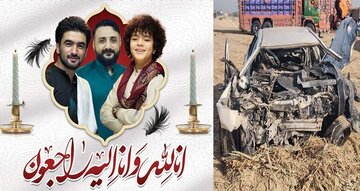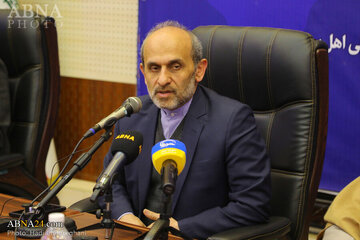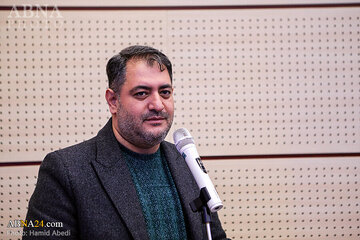AhlulBayt News Agency (ABNA): In the ceremony honoring former congregational prayer leaders of Saveh, Ayatollah Reza Ramezani, the Secretary-General of the AhlulBayt (a.s.) World Assembly emphasized that honoring people is a tradition of the prophets and must be prioritized. “Guidance belongs exclusively to God, but in the system of Legislation Guidance, the guidance has been entrusted to religious scholars, and in this regard, scholars serve as intermediaries between the people and the Infallible Imams (a.s.).”
Pointing to the significance of the role of scholars and clerics in raising public awareness, especially in shaping the understanding system of the younger generation, the Secretary-General of the AhlulBayt (a.s.) World Assembly stated, “Direct and face-to-face interaction of clerics, particularly those stationed in various cities and villages, can resolve a substantial portion of the people’s challenges and difficulties.”
Ayatollah Ramezani added, “Religious propagation is the most effective factor in reducing the problems and challenges of the Islamic society and can play a significant role in mitigating social harms.”
He stated, “At present, we are faced with various interpretations of Islam, some of which are distorted. Concepts such as secular Islam and ‘merciful Islam’ attempt to downplay the social and political functions of religion through incorrect interpretations.”
Continuing his remarks, the Secretary-General of the AhlulBayt (a.s.) World Assembly referred to three general perspectives throughout history regarding religion: opposition to religion, a minimalistic approach, and a maximalist approach. He stated, “In the opposition approach, efforts are made to weaken or eliminate religious beliefs. In the minimalistic approach to religion, which is generally promoted by secularist ideologies, religion’s role is confined solely to individual matters.”
Ayatollah Ramezani continued, “On the other hand, the maximalist approach, which at certain points in history, such as during the rule of the Church in the West, was accompanied by religious extremism, led to a conflict between religion and reason or between religion and science.”
He went on to say, “Religion is the matter of Fitrah and reason; therefore, it cannot be eradicated. In the Islamic government of Iran, as founded by Imam Khomeini (r.a.), religion plays a role, not only in acts of worship and spirituality but also in social, cultural, political, and economic spheres.”
Concluding his speech, the Secretary-General of the AhlulBayt (a.s.) World Assembly emphasized, “The guidance of the people by scholars should not be limited to verbal instruction; rather, it must be reflected in their behavior and actions. Hence, scholarly and spiritual dignity should be two key attributes of religious scholars.”
**************
End/ 345





